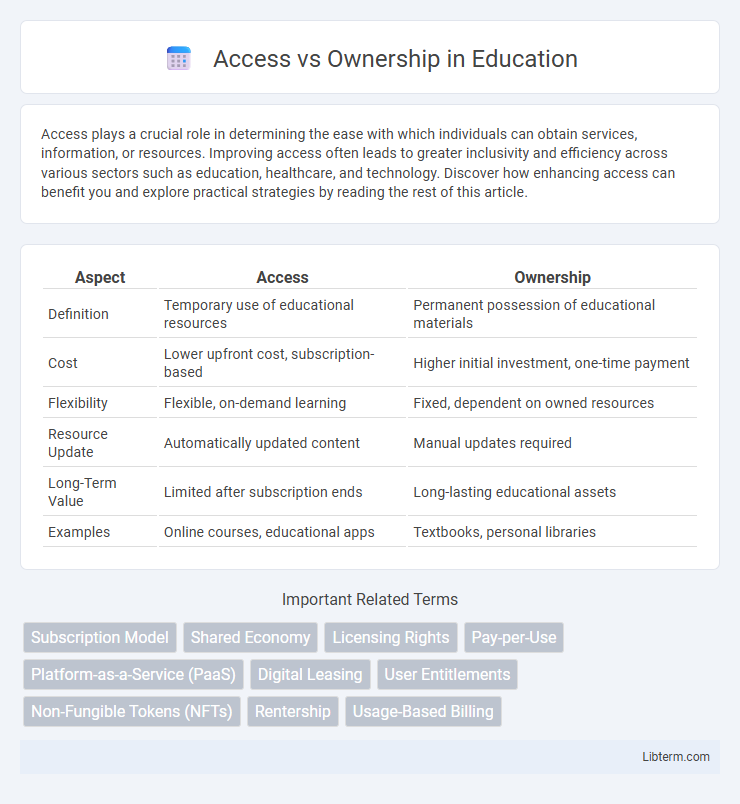Access plays a crucial role in determining the ease with which individuals can obtain services, information, or resources. Improving access often leads to greater inclusivity and efficiency across various sectors such as education, healthcare, and technology. Discover how enhancing access can benefit you and explore practical strategies by reading the rest of this article.
Table of Comparison
| Aspect | Access | Ownership |
|---|---|---|
| Definition | Temporary use of educational resources | Permanent possession of educational materials |
| Cost | Lower upfront cost, subscription-based | Higher initial investment, one-time payment |
| Flexibility | Flexible, on-demand learning | Fixed, dependent on owned resources |
| Resource Update | Automatically updated content | Manual updates required |
| Long-Term Value | Limited after subscription ends | Long-lasting educational assets |
| Examples | Online courses, educational apps | Textbooks, personal libraries |
Understanding Access vs Ownership
Understanding access versus ownership clarifies whether individuals control assets by possession or through usage rights without holding title. Access allows temporary or conditional use of resources, often enabled by sharing economies and subscription models, while ownership grants full legal rights and responsibilities over an asset. This distinction impacts financial decision-making, asset management, and personal lifestyle choices in modern economies.
Historical Perspectives on Ownership
Historical perspectives on ownership reveal its roots in agrarian societies where land possession symbolized wealth and power, shaping legal systems for property rights. The Industrial Revolution marked a shift, emphasizing ownership of capital and goods rather than land, influencing modern economic structures. Today, debates on access versus ownership challenge traditional models, highlighting evolving values in digital property and shared resources.
The Rise of the Access Economy
The access economy revolutionizes traditional ownership models by prioritizing temporary access over permanent possession, driven by digital platforms like Airbnb and Uber that facilitate peer-to-peer sharing. Market valuation of the access economy exceeded $250 billion in 2023, reflecting consumer preference for cost-efficient, flexible, and sustainable consumption patterns. This shift challenges sectors like automotive and real estate, as subscription and rental services disrupt long-term ownership paradigms globally.
Benefits of Access Models
Access models offer increased flexibility by allowing users to utilize assets or services without the burdens of long-term commitment and maintenance costs. These models enhance cost efficiency, as users pay only for what they consume, reducing upfront investments and depreciation risks. Access frameworks also promote sustainability by enabling shared usage, which minimizes resource waste and environmental impact.
Limitations of Ownership
Ownership often entails significant financial commitments, including upfront costs, maintenance, and depreciation, which can limit flexibility and liquidity. Physical possessions require storage space and are subject to wear, obsolescence, or market fluctuations, reducing their long-term value and usability. Legal responsibilities such as taxes, insurance, and compliance further complicate ownership, making access models a preferable alternative for many consumers seeking convenience and reduced risk.
Environmental Impact: Access vs Ownership
Access models, such as car-sharing and subscription services, significantly reduce environmental impact by minimizing resource consumption and lowering carbon emissions through optimized utilization of fewer vehicles. Ownership often leads to higher ecological footprints due to underused assets, increased production demand, and greater waste generation from vehicle disposal. Transitioning to access-based systems enhances sustainability by promoting efficient resource use and reducing overall environmental degradation.
Economic Implications for Consumers
Access models reduce upfront costs, allowing consumers to use goods or services through subscriptions or rentals, which can increase financial flexibility and lower economic barriers. Ownership entails higher initial investments but offers long-term asset control, potential resale value, and accumulation of equity. Evaluating these economic implications helps consumers balance short-term affordability against long-term financial benefits.
Industry Shifts Towards Access
Industry shifts towards access over ownership reflect a growing consumer preference for subscription models, renting, and sharing platforms. Companies in sectors such as automotive, technology, and entertainment increasingly emphasize flexible access to products and services, reducing upfront costs and enhancing user convenience. This paradigm shift drives innovation in business models, promotes sustainability, and reshapes traditional market dynamics.
Challenges and Concerns with Access-Based Models
Access-based models face challenges such as limited user control and dependency on service providers, causing concerns over data privacy and service continuity. Users often experience uncertainty regarding asset availability and potential long-term costs, reducing perceived value compared to ownership. Security risks increase due to shared usage environments, requiring robust protections to maintain trust and compliance.
The Future of Access and Ownership
The future of access and ownership is shifting towards favoring access-based models driven by digital transformation, subscription services, and the sharing economy. Consumers prioritize convenience, flexibility, and cost-efficiency, fueling growth in industries such as media streaming, transportation, and accommodation through platforms like Netflix, Uber, and Airbnb. This transition challenges traditional ownership paradigms, prompting companies to innovate sustainable access strategies that meet evolving consumer preferences and reduce resource consumption.
Access Infographic

 libterm.com
libterm.com